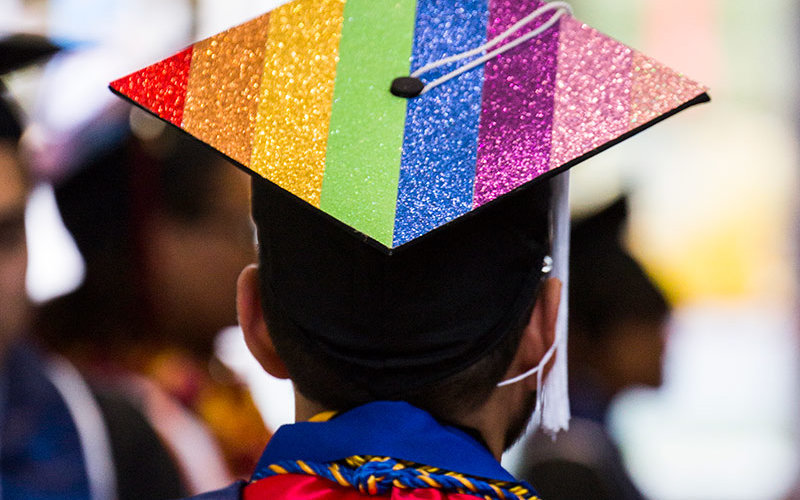
Bob Ericksen spent 23 years at Cal State Fullerton, working in what was then the Office of International Education and Exchange — now Extension and International Programs. The campus, shares the former director, “was such a home for me, personally and professionally.” Back then, there was nothing resembling the Lesbian Gay Bisexual Transgender Queer Resource Center. But Ericksen knew there was a need for such a place.
“I became aware of a number of students facing a lot of challenges in their personal lives, or who had been abandoned by their families,” he says.
The LGBTQ population often faces greater hurdles compared to non-LGBTQ peers. A 2017 report by Chapin Hall at the University of Chicago found that young LGBTQ adults had a 120 percent higher risk of reporting homelessness, compared to those who identified as heterosexual and cisgender. These findings are consistent with other research that also shows that LGBTQ youth are overrepresented among the homeless.
Karyl Ketchum, chair and associate professor of women and gender studies, which includes the queer studies minor, says she and her department colleagues are “all too aware of the many obstacles LGBTQ students face as they tackle higher education.
“Many of these students are faced with the decision of whether to hide their identities from friends and family for fear of loss of family and community support or, proudly enact their identities in the hopes of forging more meaningful relationships with loved ones. It’s a horrible dilemma, pitting authenticity against opportunity. Sadly, over my years at CSUF, I have known several students who have had to leave school because of exactly this.”
Ericksen left CSUF in 2006. When he came back for a visit in 2018, the LGBTQRC was well into its sixth year, housed within the cluster of Diversity Initiatives and Resource Centers (DIRC).
“It was so thrilling to see such a beautiful collection of centers that support students in their various backgrounds and identities — to know that students could go in and find the support that they need, especially at a very large campus like Cal State Fullerton,” he says.
After touring the center and talking to students, Ericksen was inspired to launch the Ericksen LGBTQ Grant Program, which provides financial assistance to LGBTQ-identifying students who have been affected by an unforeseen emergency, crisis, catastrophic event or personal hardship. Support may include funds for basic living expenses, such as housing, transportation or academic funding due to loss of familial support.
A five-year, $50,000 pledge supports the grant program, as well as center programming.
“Gifts such as Ericksen’s allows the LGBTQRC to expand its events and support services, thus fostering a sense of belonging for all of our Titans,” states Vincent Vigil, interim director of DIRC. “It is our hope that we can continue to grow these services and be a constant source of support for our LGBTQ community at Cal State Fullerton.”
“I am so excited and grateful to know that there will now be this additional financial resource to support our students,” adds Ketchum.
“It’s easy for someone to feel lost among the masses of students,” says Ericksen, who will be acknowledged at this year’s Lavender Celebration. “It’s crucial that we do all we can as a university to help students feel that there’s at least one place they can go where they can feel comfortable being themselves and have a home base from which they can be more successful as students — in their academic and personal lives.”
All eligible students are encouraged to apply. The LGBT Queer Resource Center does not consider gender identity, sexual orientation or any other protected status as part of the application and selection process for the grant.